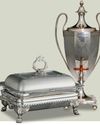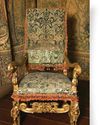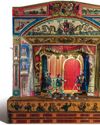
Think of Cool Britannia and the late 1990s probably comes to mind, the nation zig-a-zig-ahing its way around a Union Jack-emblazoned flurry of formaldehyde-submerged sharks and down-with-the-kids politicians. In truth, though, it was more a second coming. True Cool Britannia had peaked almost half a century earlier, during a swell of national optimism sparked by the end of the Second World War and Queen Elizabeth II's accession.
Rationing may still have been in place in Britain in the early 1950s, but light could be seen at the end of the great tunnel of austerity that had dominated people's lives for so long. The welfare state was expanding, improvements in living conditions were gradually being implemented, workers were in such high demand that migrants from commonwealth countries were starting to arrive in large numbers (albeit, shamefully, to be met with discrimination in many cases) and the middle classes were enjoying more leisure time - and the gadgets to either enable it (washing machines) or enjoy it (cars). Things were not, yet, quite as upbeat in the UK as they were in America, where both the economy and babies were booming, TVs were commonplace and rock 'n' roll was the soundtrack to a proliferation of shiny new suburbs. Yet, what might now be called a 'vibe shift' was underway.
Into this brave new cultural landscape landed 1951's Festival of Britain. Described, aspirationally, as 'a tonic for the nation' by the Festival's Director-General, former newspaper editor Gerald Barry, the event aimed to showcase Britain's science, technology, arts and industrial design, and to generate some sorely needed post-war positivity. Timed to tap into the centenary of 1851's Great Exhibition, it was focused on London specifically the South Bank, where purpose-designed buildings, such as the Royal Festival Hall, burst like futuristic teasels from what had previously been a 28-acre bombsite.
Bu hikaye Homes & Antiques dergisinin June 2022 sayısından alınmıştır.
Start your 7-day Magzter GOLD free trial to access thousands of curated premium stories, and 9,000+ magazines and newspapers.
Already a subscriber ? Giriş Yap
Bu hikaye Homes & Antiques dergisinin June 2022 sayısından alınmıştır.
Start your 7-day Magzter GOLD free trial to access thousands of curated premium stories, and 9,000+ magazines and newspapers.
Already a subscriber? Giriş Yap

Lisa Coppin
The Cotswold Company’s chief creative officer shares the pieces that mean so much to her

TRAVEL
Six of the best pineta, plus a festive trip to Covent Garden. Review of The Orange, Belgravia by Katie Pike, travel stories

OLD SHEFFIELD PLATE
Stumbled upon by chance, this ingenious material was a more affordable option than solid silver, and well-preserved examples are particularly desirable today

Merrily on high
Summoning servants since the 1700s, bell boards create instant English country-house style (even if you don't have any servants). Emma Longstaff dons her pinny

Let it snow
Nostalgic, magical and highly collectable, snow globes are curious objects of wonder that never fail to instil joy

Velvet Crush
Once the preserve of the wealthy, velvet finally touched all levels of society, thanks to advances in its production process

Celebrating in the Stable
Antiques dealer Julia von Hülsen specialises in Gustavian pieces - all of which look perfectly placed in her German home

THE SHOW MUST GO ON
Victorian toy theatres charming and exquisitely designed miniature worlds have inspired theatre royalty for decades. Today, the tradition is being kept alive by a small but talented network of makers

NICHOLAS LEES
The ceramic artist talks to Dominique Corlett about new ways of working with clay and blurring the edges of solid objects

Candy CHRISTMAS
Pastel hues, vintage decorations and bowls of sweet treats: the festive run-up is gloriously joyful at Bettina Færgeman's historic Copenhagen apartment, where there's an emphasis on entertaining...